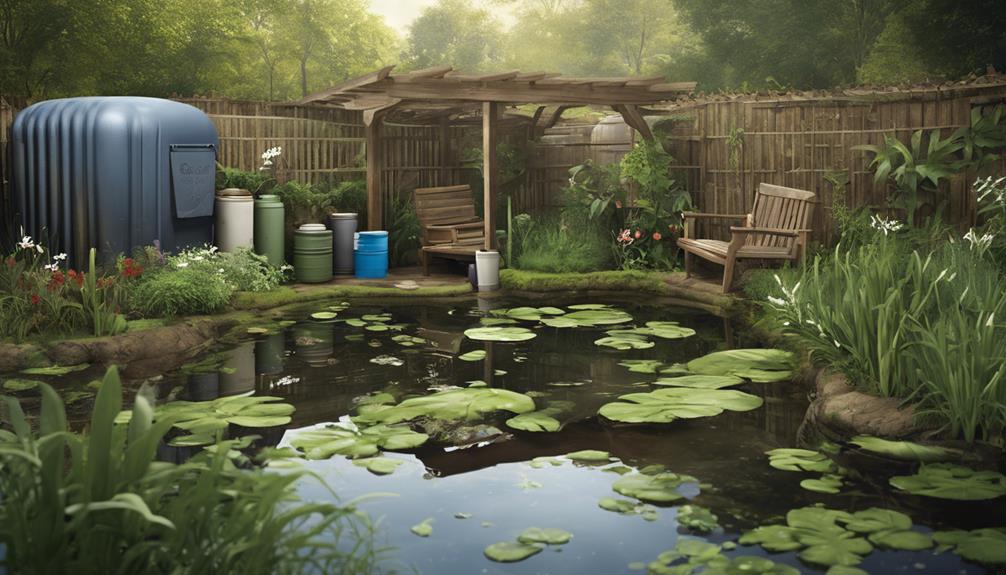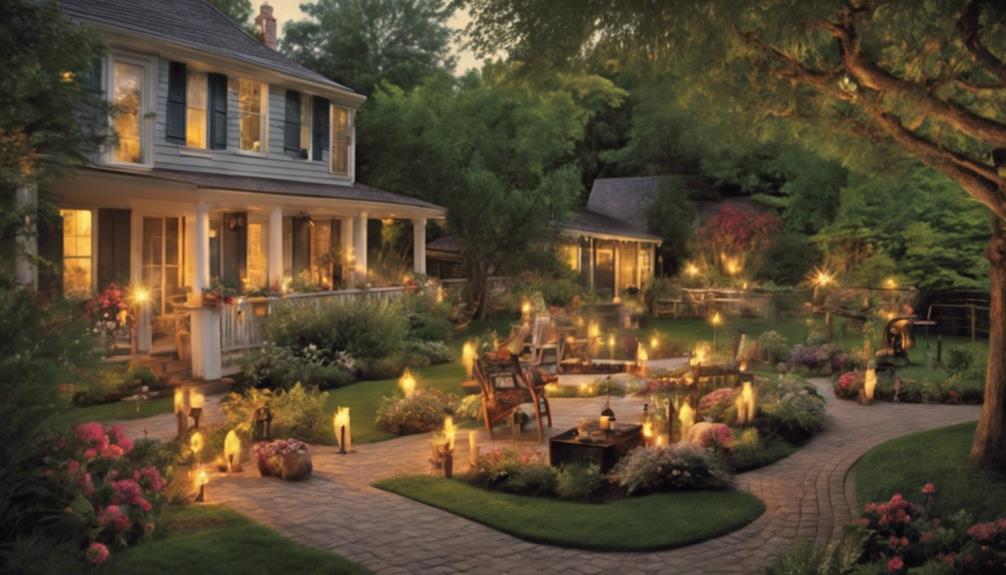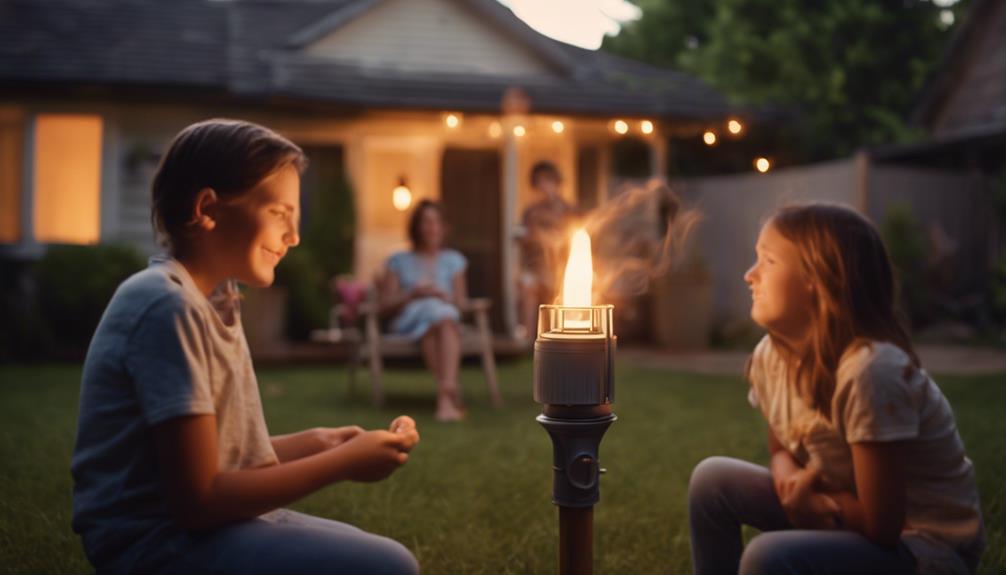To keep mosquitoes away from your property, focus on eliminating standing water where they breed. Mosquitoes lay hundreds of eggs, so removing water disrupts their cycle. Be aware that they are most active during dusk and dawn, requiring precautions like repellents and protective clothing. Citronella and DEET repellents are effective, with higher concentrations offering longer protection. Modify your landscaping with mosquito-repelling plants and cedar mulch. Use screens on windows and doors and consider Shakespeare pest control services for tailored solutions. Understanding these behaviors is key to managing mosquito presence on your property.
Key Takeaways
- Remove standing water to disrupt breeding cycles.
- Use repellents during peak activity times.
- Choose DEET for disease prevention.
- Employ landscaping strategies to deter mosquitoes.
- Consider professional pest control for tailored solutions.
Mosquito Breeding Habits

In the domain of mosquito behavior, understanding their breeding habits is essential for effective property protection. Female mosquitoes are attracted to standing water as their primary mosquito breeding sites. They lay eggs on the surface of stagnant water, even in small or seemingly insignificant containers like bottle caps. These eggs can survive in dry conditions for months, waiting for the presence of water to hatch into larvae. Each female mosquito has the potential to lay hundreds of eggs during her lifetime, increasing the risk of infestations on your property.
To reduce mosquito populations and prevent infestations, it’s vital to regularly remove or treat any standing water sources where mosquitoes lay their eggs. By disrupting the mosquito breeding cycle, you can considerably decrease the number of mosquitoes around your property. Consistent efforts in eliminating stagnant water will prove to be a key strategy in effective mosquito prevention.
Peak Activity Times
During dusk and dawn, which are the peak activity times for mosquitoes, they’re most actively seeking blood meals for reproduction.
Mosquitoes exhibit heightened aggression and persistence during these hours, making essential measures pivotal to prevent bites.
Utilizing repellents and wearing protective clothing can greatly reduce the risk of mosquito encounters during their peak activity times.
Dusk and Dawn
At peak activity times, mosquitoes exhibit heightened aggressiveness and are more inclined to seek out hosts, particularly during the intermediary periods of dusk and dawn. These times, known as critical periods, coincide with sunrise and sunset, making them essential periods to be cautious of mosquito presence.
Mosquitoes are more aggressive during these times, increasing the risk of mosquito bites. To protect yourself, it’s advisable to avoid outdoor activities during dusk and dawn. Additionally, using repellents and wearing protective clothing can be effective strategies to prevent mosquito bites when you must be outside during these times.
Understanding the behavior of mosquitoes during dusk and dawn can help you take proactive measures to keep them away from your property.
Nighttime Feeding
As nighttime descends, mosquitoes intensify their quest for blood meals, reaching their peak feeding activity during these dark hours.
Mosquitoes are most active during dusk and dawn, known as their peak feeding times. To reduce the risk of mosquito bites, it’s advisable to avoid outdoor activities during these peak mosquito hours.
Mosquitoes are more attracted to hosts at night due to the darkness and their feeding habits. Using repellents and protective clothing during nighttime hours can help prevent mosquito bites.
Repellent Types and Usage

When considering repellent types and usage, understanding the differences between chemical options like DEET and natural alternatives such as citronella is important.
DEET is known for its high effectiveness levels, while citronella offers a more eco-friendly approach.
Proper application techniques are essential to maximize the repellents’ efficacy and guarantee safe usage.
Spray Vs. Citronella
Derived from lemongrass, citronella is a natural repellent that masks scents attracting mosquitoes, contrasting with sprays containing chemical compounds like DEET or picaridin, which create a barrier on the skin to deter these insects.
When considering which option to use for effective mosquito control, here are some key points to keep in mind:
- Citronella candles and oils are popular for outdoor use.
- Sprays offer convenient personal protection.
- Citronella has a limited range of effectiveness compared to sprays.
Both citronella and sprays can be effective when used correctly. Your individual preferences and specific situations may influence the choice between these repellents for the best mosquito control.
DEET Effectiveness Levels
For the best mosquito protection, understanding the effectiveness levels of DEET repellents and their various types is essential. DEET, a highly effective mosquito repellent, is recommended by the CDC for preventing mosquito-borne diseases like Zika virus and West Nile virus. It works by disrupting mosquitoes’ ability to detect human odors, thereby making it harder for them to locate and bite.
Higher concentrations of DEET provide longer-lasting protection, with 20-30% DEET being suitable for general outdoor activities. Importantly, DEET is safe for children over 2 months old when applied correctly, offering reliable defense against mosquitoes.
Landscaping for Mosquito Deterrence
Landscaping plays an important role in deterring mosquitoes from your property by strategically planting mosquito-repelling plants and eliminating breeding grounds.
When planning your landscaping for mosquito deterrence, consider the following:
- Plant Mosquito-Repelling Plants: Incorporate geraniums, marigolds, and rosemary into your landscaping design. These plants naturally repel mosquitoes with their scents, helping to keep them away from your property.
- Use Cedar Mulch: Opt for cedar mulch in your garden beds. When exposed to sunlight, cedar mulch releases an aroma that can assist in deterring mosquitoes.
- Avoid Breeding Grounds: Be mindful of potential breeding grounds for mosquitoes. Turfgrass isn’t attractive to mosquitoes, but plants like English Ivy, which retain water, can create breeding spots for these pests.
Home Modifications for Control

To enhance your property’s defense against mosquitoes, consider implementing strategic home modifications that can effectively control these pests. One key modification is installing screens on windows and doors to prevent mosquitoes from entering your home. Using yellow bug lights in outdoor areas can also help deter mosquitoes from congregating, reducing their presence near your property. Additionally, positioning outdoor fans strategically can disrupt mosquito flight patterns, making it difficult for them to hover around specific areas. Proper landscaping techniques play a vital role in controlling mosquitoes; removing overgrown vegetation eliminates mosquito resting spots, decreasing their breeding grounds. For a more comprehensive approach, utilizing professional pest control services can provide effective long-term solutions for mosquito control. By addressing entry points and optimizing your living space to keep mosquitoes at bay, you can create a more comfortable and mosquito-free environment.
| Home Modification | Benefit | Implementation |
|---|---|---|
| Screen Installation | Prevents mosquito entry into home | Install screens on windows/doors |
| Yellow Bug Lights | Deters mosquitoes from congregating | Use yellow bug lights in outdoor areas |
| Strategic Fan Placement | Disrupts mosquito flight patterns | Position outdoor fans strategically |
| Landscaping Techniques | Eliminates mosquito resting spots | Remove overgrown vegetation |
Professional Pest Control Services
Professional pest control services utilize targeted treatments incorporating larvicides and residual insecticides to effectively manage mosquito populations. By employing Integrated Pest Management (IPM) strategies, professionals combine various control methods for lasting results in mosquito control. Expertise and proactive measures from professional pest control services are essential for providing effective and customized mosquito control solutions.
Thorough property inspections: Professionals conduct detailed inspections to identify and eliminate mosquito breeding sites, ensuring thorough control.
Customized solutions: Tailored approaches are developed to address specific needs of individual properties, maximizing effectiveness.
Science-based treatments: Services provided by professionals like Shakespeare Pest Control are specialized and based on scientific research, offering advanced mosquito control solutions.
With these advanced techniques and customized approaches, professional pest control services play an important role in safeguarding your property from mosquito infestations effectively and efficiently.
Frequently Asked Questions
How Do I Get Rid of Mosquitoes Around My Property?
To get rid of mosquitoes around your property, focus on natural repellents like essential oils, proper mosquito control, and eliminating standing water. Utilize outdoor lighting, DIY traps, and landscaping tips with repellent plants for effective mosquito prevention.
What Makes Mosquitoes Stay Away From You?
To keep mosquitoes away, utilize natural repellents like citronella, lavender, and peppermint. Implement effective traps, adjust outdoor lighting, understand mosquito habits, and consider weather impact. Eliminate breeding grounds, use plant deterrents, and explore DIY solutions for thorough protection.
What Smell Do Mosquitoes Hate?
Mosquitoes hate citronella candles, lavender oil, peppermint spray, lemon balm, eucalyptus plants, rosemary bushes, tea tree, and sage incense. Use these scents to repel mosquitoes effectively and keep them away from your property.
What’s the Best Way to Prevent Mosquitoes in Your Backyard?
To prevent mosquitoes in your backyard, eliminate standing water, use natural repellents like citronella candles and essential oils, maintain dry landscaping, consider mosquito traps, screen in your porch, wear protective clothing, and plant mosquito-repelling greenery.




